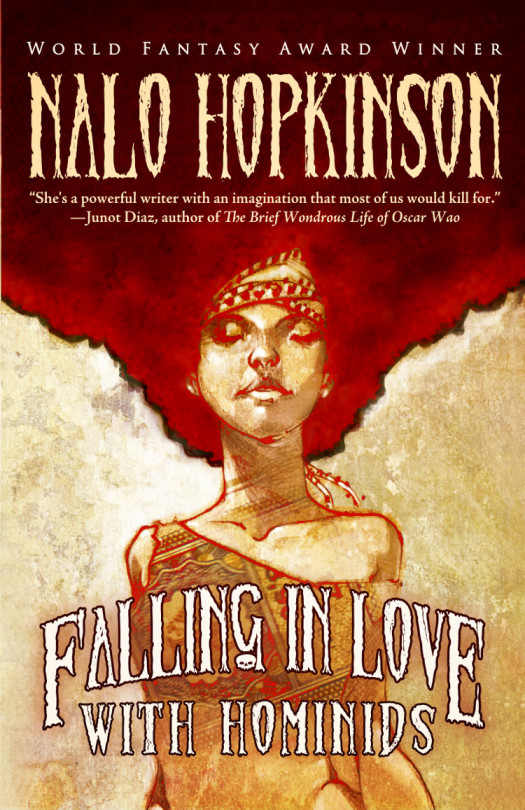FALLING IN LOVE WITH HOMINIDS reflects all the contrasting emotions that make us human

Nalo Hopkinson was named a 2015 RT Reviewers’ Choice and Career Achievement Winner.
Today we’re so happy and proud to present the 2015 Reviewers’ Choice and Career Achievement Winners! Let us tell you, a lot of blood, sweat and tears (more tears than you might think!) went into selecting these, the best titles of 2015. Hearty congratulations to all of the winners, thank you for writing such amazing books last year. The award ceremony will take place at the RT Convention in Las Vegas next month, we hope to see many of you there!

IN TORI LEX reviews FALLING IN LOVE WITH HOMINIDS.
I really enjoyed my introduction to Ms. Hopkinson’s work. From the very beginning it was clear that these stories would reflect all the contrasting emotions that make us human. She explains in the foreward "We are, all of us, capable simultaneously of such great good and such horrifying evil.“ The vivid imagery, plain language and memorable diverse characters made almost all of the short stories very enjoyable. I noticed how many times she mentioned hair, characters doing each other’s hair reminded me so much of my own life. Hearing about twisting dreadlocks and taming afros immediately made my heart glad, because it reminded me of my many friends and family members. It was refreshing to see some of my identity and culture reflected back at me.

None of the stories are connected and the different themes and settings kept me intrigued along the way. Between elephants in rooms, limitless food for the hungry, time travel and fragrant tattoos, I was righteously entertained. There were nice introductions to the stories to help orient the reader, and gain more understanding about her writing process.
CARIBBEAN BEAT interviews Nalo Hopkinson.
Caribbean Beat: How do you define speculative fiction?
Nalo Hopkinson: I generally only use the term “speculative fiction” in academic circles. Science fiction and fantasy are literatures that challenge the complacency of our received wisdoms about power, culture, experience, language, existence, social systems, systems of knowledge, and frameworks of understanding. They make us reconsider whose stories deserve to be told, whose narratives shape the future and our beliefs, and who has the “right” to make and remake the world.
Is there a distinctively Caribbean kind of spec-fic?
A bunch of Caribbean SF/F [science fiction/fantasy] writers will be gathering to discuss this in March at the University of California, Riverside, as part of a year of programming I’m co-organising on alternative futurisms. I suspect one of the things we’ll end up talking about is Caribbean relationships to the experience of resistance — how it’s shaped our histories and imaginations, and so how it must shape our imaginative narratives. For instance, when I watch The Lord of the Rings, I wonder what the orcs do to rebel against their forced existence as beings created to be foot soldiers and cannon fodder.
We’ll probably also talk about the unique impact of place and space on the Caribbean psyche. I recently wrote a short story for Drowned Worlds, a fiction anthology on the theme of the effects of rising sea levels worldwide. For me, coming from island nations whose economies are often dependent on bringing tourists to our beaches, and which are the guardians of so much of the world’s precious biodiversity, it was particularly painful and personal to write a story about what will become of our lands. The resulting piece is angry and spooky, and combines science with duppy conqueror in ways that are uniquely Caribbean.
On the panel, we might also talk about language. The multiple consciousness that Caribbean history gives us is reflected in our code-switching, code-sliding, code-tripping dancehall-rapso-dubwise approach to signifying simultaneously on multiple levels. Science fiction reaches for that in its use of neologisms. Caribbean people, like so many hybridised peoples the world over, live it. We are wordsmiths par excellence.
Read the rest of the fascinating interview at CARIBBEAN BEAT.
For more information on FALLING IN LOVE WITH HOMINIDS, visit the Tachyon page.
Cover art by Chuma Hill
Design by Elizabeth Story
